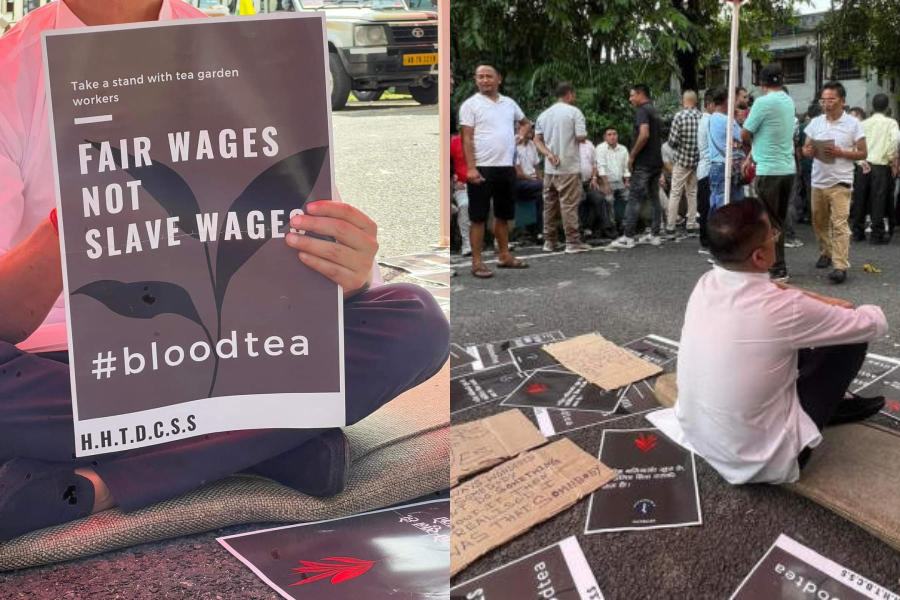The spectre of the “blood tea” label for Darjeeling Tea is looming large at a time when acrimony is brewing over bonus negotiations in the hills.
The “blood tea” campaign which was first started by Ajoy Edwards, elected GTA Sabha member and president of Hamro Party, in 2022, made a poster comeback on Sunday.
On Sunday, Edwards sat at a dharna at Shramik Bhavan in Siliguri to lend support to the demand of hill tea garden unions for a 20 per cent bonus for the workers.
Edwards while sitting on dharna put up posters with the hashtag “Blood Tea”.
“Take a stand with tea garden workers. FAIR WAGES NOT SLAVE WAGES #bloodtea,” the posters prepared by Edwards’s team read.
The management of tea gardens as a whole has not agreed to a bonus of 20 per cent of the worker’s annual salary, calling it too high. The festive bonus is the sum given to each tea worker annually.
This was the fourth time that the meeting, which is being facilitated by the state labour department, is being held.
The tea gardens of the Dooars and the Terai have settled for a 16 per cent bonus, although the workers there too had demanded 20 per cent.
In 2022, many planters felt that the “blood tea” campaign had the potential to hit the image of Darjeeling Tea globally. It is no different now.
The “blood tea” campaign seems inspired by the “blood diamond” campaign across the world. The label was given to diamonds mined in war zones and used for negative purposes like financing insurgency and civil wars and invading army’s war efforts or a warlord’s activities, mostly in African countries.
“Desperate times call for desperate measures. The situation is such that we might have to start an agitation over this bonus issue. We can go to any extent for the workers’ right,” Edwards told The Telegraph when asked about the “BloodTea” campaign.
Planters said that leaders should act responsibly “when negotiations are going on”.
Planters recalled that a similar campaign by Edwards in 2022 was in bad taste.
That year, the management of the Terai and the Dooars had agreed to pay a bonus at the rate of 20 per cent but the Darjeeling management agreed to pay 20 per cent in two installments — 15 per cent before Durga Puja and the remaining 5 per cent percent before Diwali. The hill unions had demanded payment in one go — 20 per cent at once — like in the plains gardens.
When the management of Happy Valley abandoned the garden before disbursing the bonus, Edwards went to the garden and sprinkled blood on the tea leaves as a “symbolic gesture” to highlight the “blood, sweat and pain of the tea workers”.
The move was condemned not just by the Darjeeling Tea industry but also by the Terai tea industry.
Darjeeling BJP MLA from the GNLF Neeraj Zimba went to the Happy Valley after two days and sprinkled Gangajal (holy water), cow’s milk and cow’s urine on tea bushes where Edwards had earlier sprinkled blood, to avowedly “purify” the plants.
“Darjeeling Tea is world famous. The fault lies with the tea management and not tea bushes. By sprinkling contaminated blood what is he (Edwards) trying to do? There could be a conspiracy behind this propaganda,” Zimba had said.
A worried tea planter had then said: “Nobody has done more damage to the industry than Ajoy Edwards for his political interest. The state government must take serious note of this false campaign.”
The worry of planters stems from the fact that more than 60 per cent of the Darjeeling Tea or over
6.5 million kg of made tea is exported. Industry principals believe that such campaigns could have an adverse impact on global markets
and buyers.
Strike call
The trade unions from Darjeeling hills have called a 12-hour general strike on Monday in the region after the fourth round of tea bonus talks for Darjeeling gardens failed on Sunday.
“The management only offered a 13 per cent bonus for the Darjeeling tea workers. Hence, we have decided to appeal to all to observe a 12-hour strike from 7am to 7pm. The workers will come out on the streets and appeal for a strike,” said Suraj Pathak, former Rajya Sabha MP of the CPM and a trade union leader.
Eight hill-based unions have formed a common platform to demand a 20 per cent bonus.
Pathak also said tea garden workers would gather in front of their factories and not attend work starting Tuesday.
“The management cannot mark them absent,” said Pathak.
The meeting held in Siliguri was facilitated by the state labour department.
Pathak said that if the department issues an advisory on the bonus, it should be for 20 per cent and no less. “We will no longer accept any advisory of the labour department regarding bonus if it is less than 20 per cent,” said Pathak.











